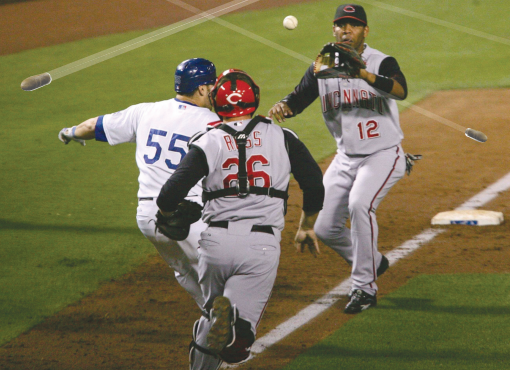
A long time ago, in a land far, far away, I rounded third and found myself in a pickle. With rounds snapping overhead, I heard my teammate call in over the radio that I was “pinned down.” Back and forth I went, caught in somewhat of a deadly rundown. As with any competitive event, there were uncontrollable and unfair circumstances leading to this moment.
Uncontrollable and unfair circumstances often cause an untrained mind to justifiably experience the effect of self-pity, doubt, and fear of failure. These emotions are justified as a natural response to circumstance. However, they provide no value. I call this Value vs. Justification. Valuable emotions are often not the natural reaction to circumstance and must be trained, hence the term mental toughness.
"Mental toughness is the ability to interrupt the cause and effect cycle and insert thought and action that produce value, regardless of what may be justified by circumstance, until the valuable principles become our habitual response."
–Stonewall Solutions: The Fundamentals of Winning
In adverse (real consequence for failure) and dynamic (faster than thought) circumstances, we respond with the habits we have created in our preparation, both physically and mentally. Our instructors used to tell us there are two ways to do something when creating proper habit: the right way and again. Baseballs get on you quick, and bullets get on you quicker, so every swing off of the tee and every thought we have prior to competitive execution matters when creating instinctual habits of value.
In the fight above, an untrained person may naturally view themselves as a victim of circumstance. Although this is a justified feeling, it produces no value. A victimhood mentality produces more victimhood. Think about receiving an unfair tournament seeding. We must take ownership of our situation and emotions. Through discipline we interrupt the cause and effect cycle. The opposite of self-pity is selflessness. The best way to reduce anxiety is to remove the source. Through unconditional love of something greater than ourselves, we will free ourselves from the fear of what may happen and rather, confidently inspire our teammates through it. Find an excuse to win.
Confidence is the opposite of doubt, but all too often, we place our confidence in status validation. Our confidence then becomes exposed as artificial when our performance fails. Unbreakable confidence is created through trust in sources that cannot be taken. Trust and confidence have a direct relationship. As one increases, so does the other. Therefore trust your preparation, trust your teammates, and trust your intrinsic purpose, but remember trust is always earned.
Do this regardless of the results. I could accept death as a possible result because I was convicted it was fulfilling intrinsic purpose. This frees us from fear. If the result is failure, I’m not asking you to like failure. I hate it. I’m saying we have to learn to embrace an unavoidable experience we hate, as a tool to make us better. Understand its purpose. But never fear it. Don’t give it undeserving power.
When it’s time to get it on, the same gunfight can feel one of two ways. Two men caught in an unfair situation, desperately fighting with each other, trying to stay alive…or two warriors, thankful for the opportunity to apply their skill, fighting for each other, out of love earned in their preparation.
One is normal. The other is trained. One is justified. The other is valuable. We all came home that night. The secret to mental toughness is this: when things suck, smile. Works even in gunfights. You’re going to die or you’re not, so smile and shoot back.